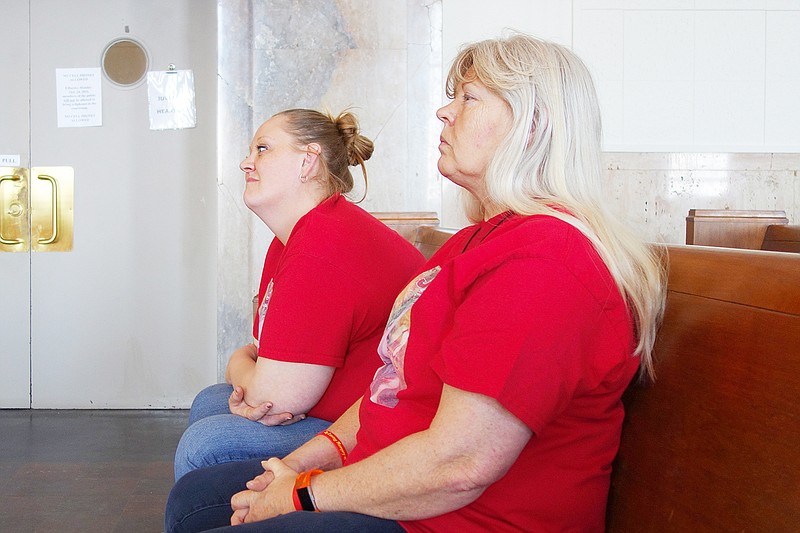After Scottie Willet's post-conviction relief hearing concluded Thursday, the mother of the child Willet was jailed for killing lingered in the courtroom.
"I feel pretty confident still that the case was handled right," Ladaynea Spencer said of the case in which Willet, 30, pleaded guilty.
For two days, public defender Valerie Leftwich argued several points on Willet's behalf. Her three key claims were that Willet did not have the capacity to plead guilty; his counsel was ineffective in failing to recognize this; and he was coerced into pleading guilty out of fear of the death penalty when, Leftwich said, his mental disabilities would preclude him from receiving it.
"My son also had a disability, and I still don't think his rights are being recognized," Spencer said.
She and Laura Armstrong, her mother, wore T-shirts and necklaces bearing 6-year-old Dayne Hathman's image.
"It's all about Dayne," Armstrong added.
Leftwich and responding attorney Bruce Allen have until May 18 to file final documents in the case, after which the judge will either overrule or sustain Leftwich's motion.
"Should Judge Harris sustain the motion for post-conviction relief, then the guilty plea entered by Willet would be set aside and the case would return to the original pre-plea status," Callaway County Prosecuting Attorney Christopher Wilson said. "The charges would remain pending and the matter would be set for trial."
According to the probable cause statement, Willet initially admitted guilt in the case when being interviewed Aug. 28, 2014, by Callaway County Sheriff's officials Dennis Crane (former sheriff) and Clay Chism (current sheriff). At that time, Willet said he deliberately shot Dayne multiple times with a .40-caliber handgun at a residence he shared with the boy and his mother on Primrose Lane in Fulton.
The former Fulton resident received life without eligibility of parole in June 2016 for first-degree murder, plus a 20-year sentence for armed criminal action.
Lawyers testify
On Thursday, several members of the legal team initially involved with the Willet case took the stand.
Willet's former co-counselors Justin Carver (now a district defender) and public defender Chelse Mitchell testified about their handling of the case. Both said they had reviewed Willet's academic, medical and psychiatric records.
"My opinion was that he did suffer from an intellectual disability," Carver said.
To get professional confirmation and determine Willet's competency, he and Mitchell hired a psychologist with whom they were familiar. The psychologist reviewed Willet's files and assessed him in March 2016, according to evidence submitted by Leftwich.
The psychologist ultimately concluded Willet was competent to plead guilty or stand trial. Carver and Mitchell said they made efforts to make sure Willet understood the legal proceedings.
"The language you use has to be simplified, no fancy lawyer words," Carver said. He added he told Willet that pleading guilty meant, "He never gets out, ever."
Mitchell had Willet explain concepts back to her in his own words and double-checked that he remembered topics discussed at previous meetings.
Leftwich questioned why the defenders didn't hire other mental health experts to assess Willet. During cross-examination, Carver affirmed he trusted the psychologist's expertise. Willet also expressed willingness to plead guilty, Mitchell said.
"We didn't think a (neuropsychologist) was necessary for a guilty plea," she added.
Wilson, who served as prosecutor during Willet's case, also testified.
He said he regularly spoke with Carver before and during the plea-bargain process and told him if the case went to trial, Wilson would seek the death penalty.
"There were four (aggravated circumstances) in my mind that stood out as possibilities, all subsets of depravity of the mind," Wilson said.
Leftwich brought up reports about Willet's mental health and asked if, given state and federal law around the death penalty and the mentally disabled, Wilson thought Willet could actually have received the death penalty.
Wilson said he still believes the case is eligible. He also noted he had no doubt Willet was capable of taking the plea, based on information from Carver. He brought up another first-degree murder case in which, doubtful of the defendant's mental status, he personally hired a mental health expert to do an evaluation.
"The things I was seeing suggested to me (Willet) was perfectly capable of making a decision," he said.
Carver said he did not see Wilson's promise to seek the death penalty if the case went to court as a threat.
"He's very up-front about things," Carver said.
Allen also objected to that characterization during his closing summary.
"Just because someone pleads guilty to avoid the death penalty doesn't mean he was coerced," he said.
A recap of the hearing's first day can be found at bit.ly/2qboFon.

